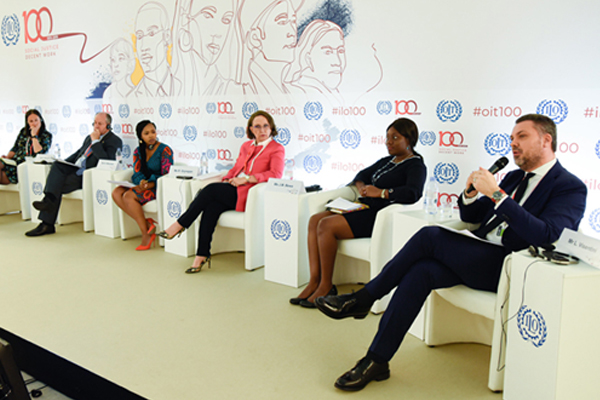|
Social Protection Critical Amid Deep World Of Work Changes
Participants at a forum held at the International Labour Conference (ILC) discussed how digitalization, demographic shifts, climate change and globalization will affect the way people manage transitions during the course of their lives.
Speakers stressed the importance not only of decent job creation policies but also of social protection to help workers, and particularly the most vulnerable, manage those transitions.
ILO Director-General Guy Ryder pointed out that 55 per cent of the world’s population is still not covered by social protection. “The global commitment to social protection is a prerequisite to securing sustainable transitions over the life course,” he said.
Christine Lagarde, Managing Director of the International Monetary Fund, spoke of “social spending,” which she said includes social insurance and social assistance, as well as public spending on health and education.
“Social spending is not just an expense, but rather can be among the wisest of investments in the well-being of our societies. Expansion of access to education and health generates broader productivity across the population, allowing all citizens to flourish. To reap the rewards of a stronger global economy societies must begin by strengthening social programmes today,” she said.
“I would argue that social spending is a core component of the social contract needed to fulfil the missions of our respective institutions.”
Michelle Bachelet, United Nations High Commissioner for Human Rights, said, “by mitigating the negative impact of unemployment, creating access to further education, improving labour market opportunities, and securing access to at least the core contents of the right to health, food, water and sanitation, education, housing, social security systems, you can ensure that individuals in all of society are protected from the worst impact of upheavals.”
Ernesto Murro, Minister of Labour and Social Security of Uruguay, said, “Every country must define its destiny, creating social protection systems that are sustainable but that also take into account that it is a fundamental right, that take into account labour and the new forms of work.”
Luca Visentini, General Secretary, European Trade Union Confederation, said it was essential that workers, including those in the gig economy, had access to lifelong learning and “have real access to universal social protection systems that can protect them from shocks… but at the same time can also make transitions smoother.” But, he added, “all this doesn’t work if there is not a clear strategy in place for quality job creation.”
Rebeca Grynspan, Secretary-General of the Ibero American Conference, who was a member of the Global Commission on the Future of Work , stressed the need to, “protect workers, not jobs. We need universal social protection and we need a new right in terms of lifelong training, because you will have to change your job many times during your labour life.”
Joannie Marlene Bewa, UN Young Leader for the Sustainable Development Goals, said, “we have to make sure we have inclusive policies that build on, not only the needs of the most vulnerable, but also hear the voices and needs of young people.”
Kristin Alsos, Research Director of the Norwegian social science research foundation, FAFO and Project Leader for the Future of Work project for the Nordic Council of Ministers, pointed out that technology has the potential to create jobs. “But you can’t leave it to technology alone, because you have to have policies and you have to support job creation and support capital being used for job creation, and not properties or financial markets and so on.”
Pawe? Wojciechowski, Polish Social Insurance Institution, Adviser to the President of the Employers of Poland, stressed the importance of “taming the robots” to make sure decent jobs will be available to today’s young people. “It should not be that robots control us, but that we control robots.”
|



